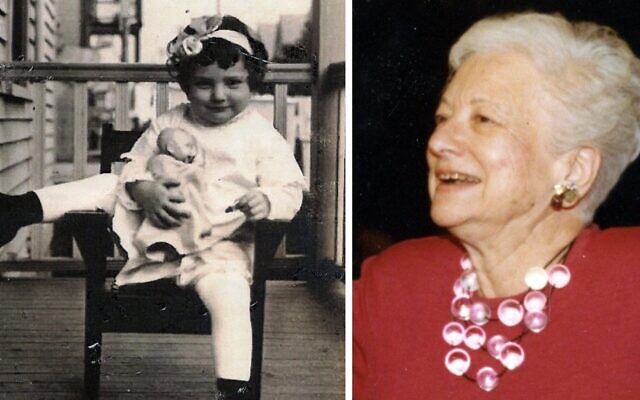‘Supercentenarian’ subject of longevity study among Ashkenazi Jews, dies at 112
“Throughout her long life, which spanned two global pandemics, she remained a lady in every sense of the word,” her family wrote in an obituary.

Louise Levy, who was the oldest living resident of New York State and a participant in a genetic study of long-living Ashkenazi Jews, has died aged 112.
“Throughout her long life, which spanned two global pandemics, she remained a lady in every sense of the word,” her family wrote in an obituary. “She will be unfailingly remembered for her grace, positivity, and kindness.”
Levy, who during her working life served as office manager in a housewares business run by her husband Seymour, was one of hundreds of Jews 95 and older who were recruited in 1998 for a study by the Institute for Ageing Research at the Albert Einstein School of Medicine in the Bronx. The cohort was chosen because its members, including some Holocaust survivors, are a homogeneous group.
The Longevity Genes Project aims to explore the “good” genes that allow people to live well into the triple digits. “I hope that in our lifetime, we’ll be able to use medicine in order to prevent age-related diseases and improve our quality of life,” its Israeli-born director, Nir Barzilai, said in a statement on the project’s website. “I think it’s our obligation as scientists to do that.”
Its findings so far include mutations in cholesterol genes and a growth hormone gene that are associated with longevity, and evidence that longevity is highly likely to be inherited. Despite their age, many in the study cohort smoked more, exercised less and weighed more than people who had died much younger. (Levy smoked cigarettes until 1965, the year she turned 55.)
Levy, meanwhile, once told an interviewer that her own family history didn’t appear to assure a long life. “My mother was never really a healthy woman,” she told the New York Daily News (although she did live deep into the 20th century).
Her father died of cancer and her only brother, Ralph, died of tuberculosis in 1933 at age 34.
Levy often ascribed her longevity to a daily glass of red wine and a low-cholesterol diet, and she said she never eats sweets. “I have orange juice, toast and coffee for breakfast which I’ve had all my life. I eat the same thing for lunch every single day, which is yogurt,” Levy told WCBS 880 in 2019. “I have a feeling that I started eating yogurt when I heard that that’s why the Russians live to such a ripe old age because they eat a lot of the yogurt. So I have that for lunch every single day with a fruit and crackers.
Her family, meanwhile, felt that her “preternatural ability to take life as it came — with the utmost equanimity — must have played a role. Once asked to reflect on the values she prized most, she named honesty, loyalty, and being helpful to others.”
Louise Morris Wilk was born on Nov. 1, 1910. Her parents, Louis Wilk and Mollie Morris, were German Jews who immigrated to Pennsylvania shortly after the American Civil War. Louise grew up in Cleveland, where her father worked as a photographer and movie theater manager. The family moved to Manhattan, where Louis Will illustrated movie posters.
Louise graduated from Wadleigh High School in Harlem before attending Hunter College, although she did not get her degree.
She and Seymour Levy were married on April 28, 1939, and had two children: a son, Ralph, and daughter, Lynn. Both are in their 70s.
In the early 1950s, Louise and Seymour left the Upper West Side and moved to the Westchester County suburb of Larchmont. Louise worked alongside her husband at I. Levy Sons until his death in 1991, and continued to work into her 90s for the man who took over the business.
In what her family calls her “third act,” Levy moved into the Osborn, a senior living community in Rye, New York. There, they write, she “became one of the most popular residents, and a kind of minor celebrity — famed for her indomitable spirit, sense of humour, and, increasingly, her longevity.”
There are 23 verified “supercentenarians” (110 years or older) including one in Japan born the exact same day as Levy.
Levy is survived by her two children, four grandchildren and six great-grandchildren.

Thank you for helping to make Jewish News the leading source of news and opinion for the UK Jewish community. Today we're asking for your invaluable help to continue putting our community first in everything we do.
For as little as £5 a month you can help sustain the vital work we do in celebrating and standing up for Jewish life in Britain.
Jewish News holds our community together and keeps us connected. Like a synagogue, it’s where people turn to feel part of something bigger. It also proudly shows the rest of Britain the vibrancy and rich culture of modern Jewish life.
You can make a quick and easy one-off or monthly contribution of £5, £10, £20 or any other sum you’re comfortable with.
100% of your donation will help us continue celebrating our community, in all its dynamic diversity...
Engaging
Being a community platform means so much more than producing a newspaper and website. One of our proudest roles is media partnering with our invaluable charities to amplify the outstanding work they do to help us all.
Celebrating
There’s no shortage of oys in the world but Jewish News takes every opportunity to celebrate the joys too, through projects like Night of Heroes, 40 Under 40 and other compelling countdowns that make the community kvell with pride.
Pioneering
In the first collaboration between media outlets from different faiths, Jewish News worked with British Muslim TV and Church Times to produce a list of young activists leading the way on interfaith understanding.
Campaigning
Royal Mail issued a stamp honouring Holocaust hero Sir Nicholas Winton after a Jewish News campaign attracted more than 100,000 backers. Jewish Newsalso produces special editions of the paper highlighting pressing issues including mental health and Holocaust remembrance.
Easy access
In an age when news is readily accessible, Jewish News provides high-quality content free online and offline, removing any financial barriers to connecting people.
Voice of our community to wider society
The Jewish News team regularly appears on TV, radio and on the pages of the national press to comment on stories about the Jewish community. Easy access to the paper on the streets of London also means Jewish News provides an invaluable window into the community for the country at large.
We hope you agree all this is worth preserving.





















